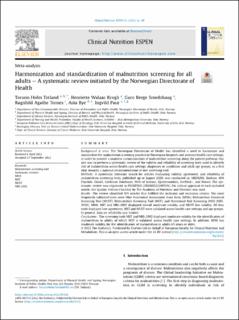| dc.description.abstract | Background & Aims The Norwegian Directorate of Health has identified a need to harmonize and standardize the malnutrition screening practice in Norwegian hospitals and primary health care settings, in order to provide a seamless communication of malnutrition screening along the patient pathway. Our aim was to perform a systematic review of the validity and reliability of screening tools used to identify risk of malnutrition across health care settings, diagnoses or conditions and adult age groups, as a first step towards a national recommendation of one screening tool. Methods A systematic literature search for articles evaluating validity, agreement, and reliability of malnutrition screening tools, published up to August 2020, was conducted in: MEDLINE, Embase, APA PsycInfo, Cinahl, Cochrane Databases, Web of Science, Epistemonikos, SveMed+, and Norart. The systematic review was registered in PROSPERO (CRD42022300558). For critical appraisal of each included article, the Quality Criteria Checklist by The Academy of Nutrition and Dietetics was used. Results The review identified 105 articles that fulfilled the inclusion and exclusion criteria. The most frequently validated tools were Mini Nutritional Assessment short form (MNA), Malnutrition Universal Screening Tool (MUST), Malnutrition Screening Tool (MST), and Nutritional Risk Screening 2002 (NRS-2002). MNA, MST and NRS-2002 displayed overall moderate validity, and MUST low validity. All four tools displayed low agreement. MST and MUST were validated across health care settings and age groups. In general, data on reliability was limited. Conclusions The screening tools MST and NRS-2002 displayed moderate validity for the identification of malnutrition in adults, of which MST is validated across health care settings. In addition, MNA has moderate validity for the identification of malnutrition in adults 65 years or older. | |
